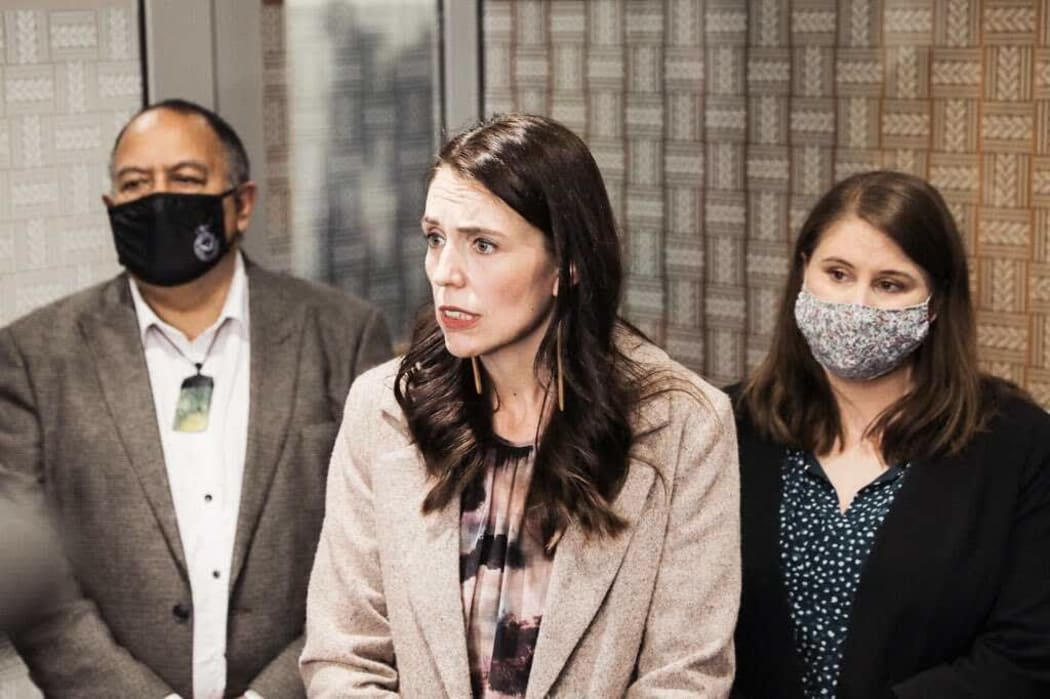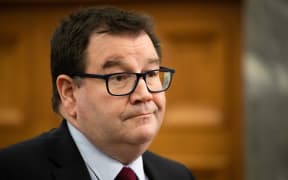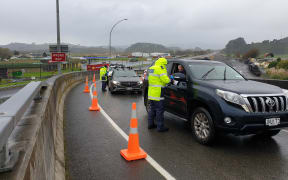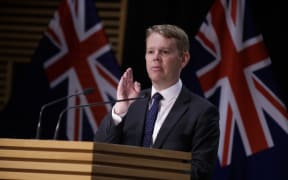By Peter Wilson*
Analysis - The government decides to ease Auckland's restrictions, raising concerns about a runaway spread of Covid-19. Anti-vaxxers desperate to be exempted from mandatory certificates start creating problems and DHBs strive to reach the 90 per cent target.

The government's decision to lower restrictions has caused concern among some quarters. Photo: RNZ/Samuel Rillstone
Prime Minister Jacinda Ardern's announcement that Auckland would on Tuesday move to Step 2 of Level 3 despite new cases running at more than 100 a day set off a chain reaction.
The in-principle decision was made at Monday's cabinet meeting and Ardern said it would remove "some of the pressure and fatigue that we know exists in Auckland".
The city's high vaccination rate allowed restrictions to be carefully eased, she said.
"It all feels hard right now - but we're going to be okay," was a widely-reported quote from her press conference.
The decision means that on Tuesday retail stores can open with safe distancing requirements and mask use, public facilities like libraries and museums can reopen and outdoor gatherings increase to 25.
The immediate reaction was concern.
"Nervous reaction to easing of lockdown restrictions" was Stuff's headline on Tuesday. It quoted microbiologist Dr Siouxsie Wiles saying she was "very nervous" about the move.
"We are going to have many people, many young people, get Covid and get long Covid as a result," she said.
The Herald's Derek Cheng said there were still hundreds of thousands of unvaccinated people in Auckland, including 300,000 children who were ineligible and who would be able to head to shops, libraries and museums.
He quoted Counties Manukau director of population health Dr Gary Jackson saying: "I worry that it's too risky. I'd much rather we had the higher vaccination rate first then we did the easing. But I also get the impatience of everybody (saying) 'Look, I'm vaccinated, why can't I go and do my business'."
RNZ quoted National Maori Pandemic Group co-leader Dr Rawiri McKree Janson, who said loosening restrictions would help create a "perfect f***ing storm" and put more Maori in harm's way.
"I've got a feeling of impending doom about it to be honest," he said.
The Director-General of Health, Dr Ashley Bloomfield, on whose advice cabinet made the decision, said bringing Auckland down to Step 2 would not add "a whole lot of additional risk".
Cheng said the decision showed how much had changed.
"Cabinet used to ask Bloomfield for the best way to keep the most New Zealanders safe," he said.
"Now he is asked what freedoms can be restored that will clearly be risky - just not too risky."
The announcement also brought the vaccination rate into sharp focus. All DHBs have to reach 90 per cent full vaccination before lockdown ends and the new traffic light system comes in.
Under that system vaccination certificates will be used to allow entry to events and close contact businesses. Staff at businesses which have to ask for certificates must themselves be vaccinated. About 40 per cent of the workforce will be affected.
By the end of the week all three Auckland DHBs looked as though they would hit the double dose target by the end of the month.
If they do, Auckland can move out of lockdown without waiting for the rest of the country to catch up.
Outside Auckland, Capital and Coast, Canterbury and Southern were past 90 per cent for first doses.
Covid-19 Response Minister Chris Hipkins indicated there could be some flexibility in decisions around when the new system could start.
"We've made a commitment not to leave people behind," he said. "That doesn't mean that if people choose to be left behind we're going to hold everybody else up because of the choice they have made."
The cabinet will decide the next moves on November 29, including what to do about the Auckland border and unvaccinated people when summer holidays come around.
Hipkins caused a flurry of disbelief when he told Checkpoint that giving Aucklanders time slots for leaving the city was being considered.
"That's the stupidest idea I've ever heard," said National's Chris Bishop.
Deputy Prime Minister Grant Robertson swiftly walked away from it, saying it was "impractical". Stuff said it understood the government was "not at all interested in pursuing it."
The imminent requirements for vaccination certificates began to create a problem that's sure to get worse when the rules kick in.
Anti-vaxxers were aggressively demanding exemptions from clinicians, Hipkins said. They weren't allowed to do that and police would act if necessary.
Stuff reported GPs were facing increasingly aggressive and abusive behaviour from those seeking to overcome mandates.
"There has been an assault on a GP and verbal abuse… It has really ramped up in a major way," said Dr Bryan Betty, medical director of the Royal New Zealand College of General Practitioners.
He said the college had told its members not to hand out exemptions and to wait for the Ministry of Health to take the lead.
It did that on Wednesday, when Bloomfield announced a medical exemption process was being set up for those who were required to be vaccinated because of their work and also for those who needed certificates to go about their daily work.
Hipkins said it was the only way people would be able to get exemption certificates and it would be a "robust" process.
Details would be on the ministry's website within days, Bloomfield said.
Twice this week anti-vaxxers made their presence noisily known, forcing Ardern to change her location on two separate trips to Kawaka and Whanganui.
In Kawaka a man identified as American Shane Chafin claimed to be a journalist, interrupted her and said she had lied to the public. Ardern shifted her press conference indoors for accredited journalists.
In Whanganui she decided not to go to a vaccination clinic where about 200 anti-vaxxers had gathered. Ardern said she decided to move the event because she wanted to encourage people to get vaccinated. "It becomes counter-productive when people congregate in a way that stops people's access (to getting vaccinated)."
Robertson told Morning Report anti-vaxxers were a tiny minority and there was another group of people who were holding back because they needed a conversation to convince them.
He said he had no time for those "getting in the way" of people who wanted to get vaccinated.
"If these so-called anti-vaxxers believe in choice, as I hear some of them say, then they should respect the choice of those who are going to get vaccinated," he said.
In other political news this week:
The government pledged to halve New Zealand's net greenhouse gas emissions by the end of the decade, a big increase on its previous target of 30 percent.
Ardern and Climate Change Minister James Shaw made the announcement, which isn't as ambitious as it sounds.
Shaw said a full two-thirds would have to be purchased from other countries at a cost of about $1 billion a year.
Both RNZ and Stuff reported there was also an "accounting trick" involved.
"As it is a net target it will take into account things like forestry offsets that take carbon dioxide out of the atmosphere, meaning the overall gross emissions will likely not reduce by as much as 50 per cent," Stuff said.
"And despite being a net target, it's a 50 per cent reduction on gross emissions from 2005. New Zealand and other countries have long used this accounting trick."
RNZ [https://www.rnz.co.nz/news/national/454683/dodgy-accounting-reveals-govt-emissions-target-less-ambitious-than-promised-lawyer quoted James Every-Palmer from Lawyers for Climate Change], who said the government was using what he saw as dodgy accounting.
On his calculations the actual reduction was less than half the government's headline figure of 50 per cent.
Shaw responded to this by cutting through the complexity. He said the accounting was sound and the amount of climate gases New Zealand was responsible for would be half what it was now.
There's likely to be a lot more arguing about that before an explanation is produced that the public has a fighting chance of understanding.
The announcement was made on Sunday and later in the week Shaw headed for the COP21 climate change conference in Glasgow where nations were signing up to emissions reduction targets.
Opposition to the Three Waters proposals announced last week continued to pour in and Local Government Minister Nanaia Mahuta continued to defend it.
She told RNZ that while it was challenging and not widely popular it was the fairest way forward.
"Two decades of underfunding waters infrastructure I think is long enough to be kicking the can down the road on this issue," she said.
"It is a challenge, it's not popular and we're getting close to local body elections and local body leaders really don't want to make a decision on such a challenging set of circumstances that they have to confront sooner or later."
One of the most controversial aspects of the reforms has been what is seen as forced transfer of ownership of water infrastructure from councils to the four huge entities that will be set up under the proposals to manage and control drinking, storm and waste water.
Mahuta has consistently maintained the position that councils would retain ownership of their water assets, but in reality the plans say councils will collectively own their relevant entity, with those four entities in turn owning the assets.
*Peter Wilson is a life member of Parliament's press gallery, 22 years as NZPA's political editor and seven as parliamentary bureau chief for NZ Newswire





